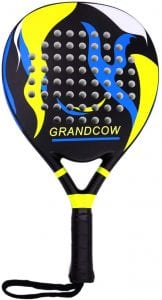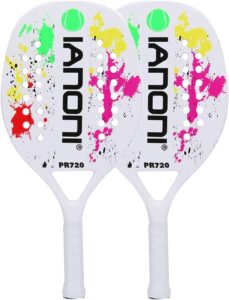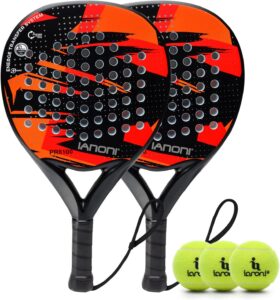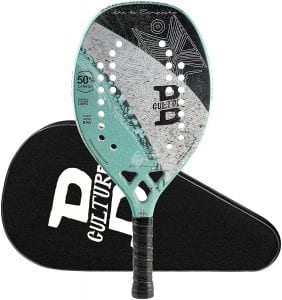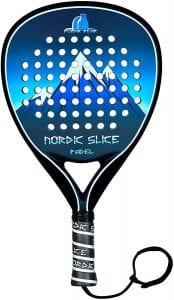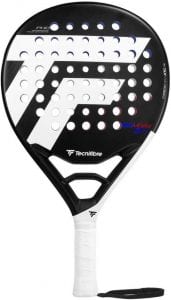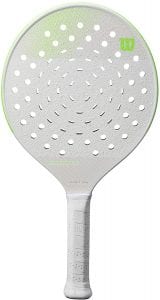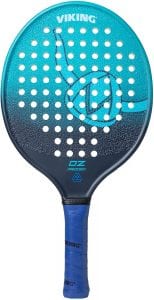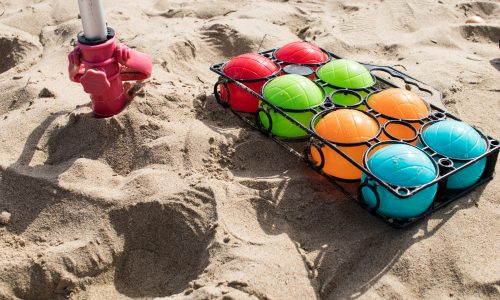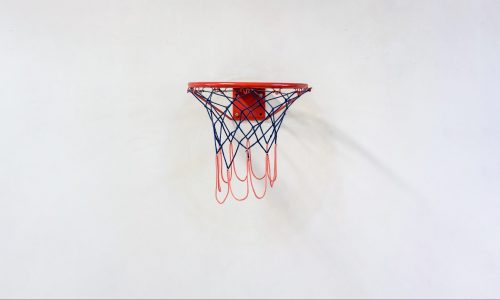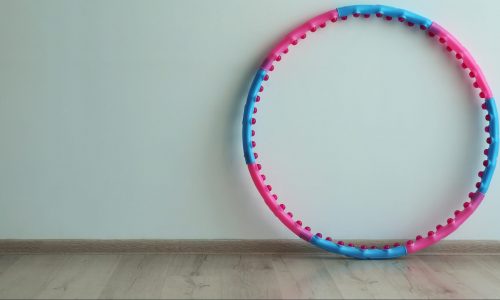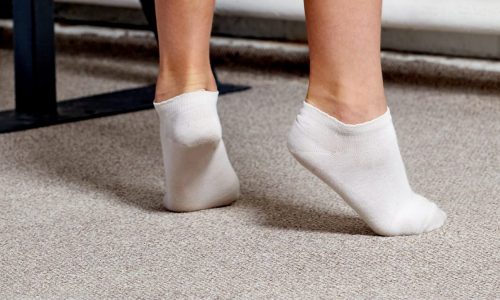Place Every Shot Perfectly With The Best Platform Paddle Tennis Racquet
We looked at the top 8 Platform Paddle Tennis Racquets and dug through the reviews from 3 of the most popular review sites including and more. The result is a ranking of the best Platform Paddle Tennis Racquets.
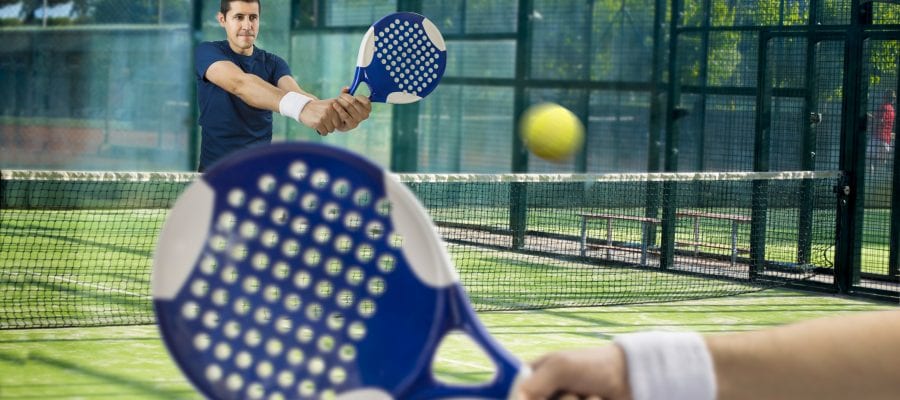
Our Review Process
Don't Waste Your Money is focused on helping you make the best purchasing decision. Our team of experts spends hundreds of hours analyzing, testing, and researching products so you don't have to. Learn more.
Our Picks For The Top Platform Paddle Tennis Racquets
- 1. GRANDCOW Sweat Resistant Power Lite Pop Platform Paddle Tennis Racquet
- 2. ianoni Adult Carbon Fiber Platform Paddle Tennis Racquet
- 3. WLSRW One Size Beginner Platform Paddle Tennis Racquet
- 4. insum Cushioned Contour Grip Platform Paddle Tennis Racquet
- 5. NORDIC SLICE Polar Bear Beginner Paddle Platform Tennis Racquet
- 6. Tecnifibre Wall Master Padel/POP Platform Tennis Paddle Racquet
- 7. Wilson Advanced Composite Platform Tennis Paddle Racquet
- 8. VIKING OZ Prodigy GG One Size Platform Tennis Paddle Racquet
With a carbon fiber composite surface and deep holes, this platform paddle tennis racquet helps increase your control as you're playing. An enlarged curve design optimizes the striking area, which means you're more likely to hit the ball with each stroke. The handle features a nonslip grip and a wrist tether to reduce the risk that it will slip out...
Lightweight but DurableMade with a carbon fiber exterior and a core surrounded by rubber, this racket is lightweight without sacrificing durability.
You'll get more feel on your strokes with this platform paddle tennis racquet, as it's made with a high-density EVA memory core. Added strength comes from the carbon fiber outer rim. This model even has a built-in safety wrist strap attached to the paddle's handle.
Moisture-Wicking HandleThis platform paddle tennis racquet is lightweight and easy to maneuver.
If you're just starting out in the sport, you'll love how lightweight this platform paddle tennis racquet feels. Although lightweight, the racquet is extremely strong and durable, so you can count on it performing during your game. Included with the set of paddles are three tennis balls.
Choice of ColorsYou'll find this platform paddle tennis racquet comes in a choice of fun color combinations, such as red, orange and black or blue, pink and black.
You can count on this platform paddle tennis racquet lasting, as it's constructed from 100% full carbon. The racquet also features a patented Central Strut Bridge for added power and better vibration absorption. You'll find the racquet is best used by intermediate players.
Great SetThe handle on this platform paddle tennis racquet has a cushioned contoured grip that is comfortable to hold.
Buying Guide
If you live in New York, Florida or California, you probably can’t get away from paddle tennis. The outdoor game is especially popular on Venice Beach and on some of the public beaches on Long Island. But in the northeast section of the U.S., platform tennis has become a popular indoor activity as well.
But another type of platform tennis has spread to other areas of the country, and the world, in recent years. Padel tennis, which is similar but has different rules, has increased the demand for platform paddle tennis rackets. Paddle tennis has also been rebranded as Pop tennis in some areas.
Both Padel and platform/Pop tennis are based on the general rules of tennis, but the courts are smaller and the rules differ. But one of the most notable differences is that Padel and Pop tennis rackets are closer to the rackets seen in games like racquetball.
Platform tennis is played on a smaller court than tennis, and the balls feature lower compression. That means your racket needs to be adjusted to match. Platform tennis rackets don’t have strings. Instead, they’re typically built with carbon fiber with a memory foam core. The head size can vary, but usually, you’ll find holes drilled into the surface to reduce friction as you’re striking the ball.
Why we recommend these platform paddle tennis racquets?
Products Considered
Products Analyzed
Expert Reviews Included
User Opinions Analyzed
Our experts reviewed the top 8 Platform Paddle Tennis Racquets and also dug through the reviews from 3 of the most popular review sites including and more. The result is a ranking of the best of the best Platform Paddle Tennis Racquets.
DWYM is your trusted roduct review source. Our team reviews thousands of product reviews from the trusted top experts and combines them into one easy-to-understand score. Learn more.
What to Look For
- The International Pop Tennis Association has set requirements for the size of the rackets used during gameplay. To meet regulations, your racket should be no longer than 18.5 inches in length or 38 millimeters in width.
- Platform tennis uses a ball with internal pressure that’s 75% of what you’d find in a tennis ball. In a pinch, you can use a standard tennis ball and puncture it to reduce its pressure. The best way to gauge a ball’s pressure is to throw it from a height of 6 feet. Its bounce back should be between 31 and 33 inches.
- For beginners, it can help to start out with a racket that has an enlarged striking area, then graduate to a more standard racket as you gain experience.
- Manufacturers often set their rackets apart by the depth and angle of the holes. Deeper holes can increase control, while angled holes boost the paddle’s grip on the ball.
- The handle is also an important feature on a racket. A nonslip grip can help ensure it stays in your hand even if you start sweating. Some also come with a wrist tether for added security.
- A racket with a silence dampener can reduce the noise as the paddle comes into contact with the ball, giving you a quieter playing experience.
More to Explore
The game of paddle tennis was invented by two neighbors in Scarsdale, New York, in 1928. James Cogswell and Fessenden Blanchard were looking for an outdoor sport they could play during the long winter months. The duo was limited in space as they built a small platform in Cogswell’s property. Only 48 by 20 feet, the platform wouldn’t work for badminton or volleyball. That led the neighbors to modify the game of tennis to create their own version of deck tennis. In 1934, Blanchard became one of the five co-founders of the American Paddle Tennis Association, which later became the Platform Tennis Association.

